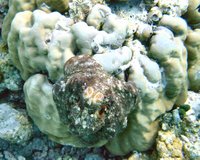 Here is some information on octopuses I have found in "Marine Life of the Maldives", by Neville Coleman, Atoll Editions.
Here is some information on octopuses I have found in "Marine Life of the Maldives", by Neville Coleman, Atoll Editions.First - I have no idea what the proper plural for "octopus" is - is it "octopuses" or is it "octopi"? The book I have here says "octopuses", so let's stick with that for now.
Besides having this fabulous ability to change colour, octopuses are supposed to be quite intelligent - they have a "well-developed brain and a highly responsive nervous system". Judging by the reaction of the one we saw in February, I would agree with these statements. The minute it saw us, it did its best to avoid us, first trying to change its colour so we wouldn't see it, then diving deeper and deeper until Brendan couldn't dive down any further. I'm sure it was thinking "will this man ever give up??"
At least, it didn't use its squirt of ink to distract us. Here is a bit from the book that I want to share with you: "Octopuses in shallow tide pools will often spray ink, or a jet of water as much as 1 metre in height. They have excellent aim, as anyone who has had a cold spurt up the leg of their shorts can vouch." Don't say you haven't been warned!
Now, how do they change colour? Here is the explanation from the book: "Cephalopod colouration is regulated by pigment cells called chromatophores in the skin. These cells can be expanded or contracted by the cephalopod at will. By rapid condensing and dispersing of the pigment cells the animal can cause instant colour changes to take place."

 Not only can they change their colour, but also their texture. One minute it looks lovely and smooth, and the next, it has big white spikes all over, and then changes again to look like the rock it's sitting on.
Not only can they change their colour, but also their texture. One minute it looks lovely and smooth, and the next, it has big white spikes all over, and then changes again to look like the rock it's sitting on.
In 2004, we saw two octopuses mating - a very quiet affair - the male has a "special organ on the end of one of its arms" which it inserts "into the mantle cavity of the female". From where we were watching, it just looked like they were sitting on a rock holding hands!
We also saw one of them in a dispute with a lunar-tailed grouper (the thugs of the reef - they always seem to be looking for a fight with other fish. It's always worth following them, as they're likely to be looking for a fight and lead you to a moray eel or another big fish). The octopus and the lunar-tailed grouper both took a similar colouring as they were facing each other off - with a big white band down the face and back. A bit like the Indians in the old Western movies with a white band in the middle of the face!
No comments:
Post a Comment